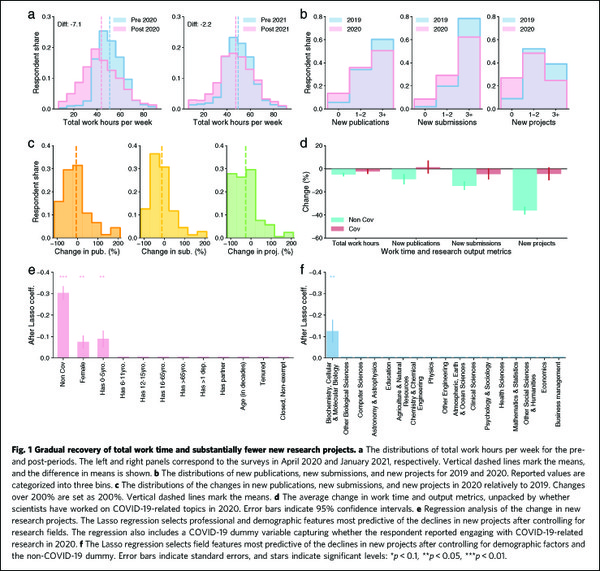The Covid-19 pandemic not only reduced scientists’ research time but made researchers less inclined to initiate new projects, a study showed. In addition, the pandemic’s impact was greater on scientists who did not carry out Covid-19-related studies.
The research team at Northwestern University in the U.S. conducted two surveys on 6,982 scientists in the U.S. and Europe in April 2020 and January 2021, respectively, and released the results in Nature Communications.
The surveys showed that time spent on research decreased by 7.1 hours to 43.8 hours per week in April 2020 from 50.9 hours per week before Covid-19.
However, as the pandemic was prolonged, their research time made some recovery. In the survey in January 2021, the difference between weekly work hours before and after the pandemic was only 2.2 hours.

After the pandemic, the proportion of scientists who started a new project shrunk.
In 2019, approximately 9 percent of scientists reported that they did not initiate any new research project. In 2020, the proportion increased about three times to 27 percent amid the pandemic.
Research topics were substantially focused on Covid-19. One-third of the respondents said they worked on Covid-19-related studies in 2020.
There were some significant differences between scientists who worked on Covid-19-related research and those who did not.
Researchers studying Covid-19-related studies had almost no changes in any of the productivity metrics compared with pre-pandemic levels.
In contrast, those who did not work on Covid-19 related research said their total work time decreased 5 percent, new publications fell 9 percent, and new projects plunged 36 percent.
It was also hard to find new co-authorships in non-Covid-19 papers.
The research team analyzed about 9.5 million articles and preprints published in 2019 and 2020 and found that the proportion of new co-authorships in Covid-19-related papers expanded 40 percent in 2020 compared to the 2019 level.
However, new co-authorships in non-Covid-19-related papers decreased roughly 5 percent.
The research team said that decline in new research projects was more pronounced in female scientists or those with young children.
“Even as universities reopen, children under the age of twelve remain ineligible for Covid-19 vaccines at the time of this writing, which has further implications for scientists with young children,” it added.

